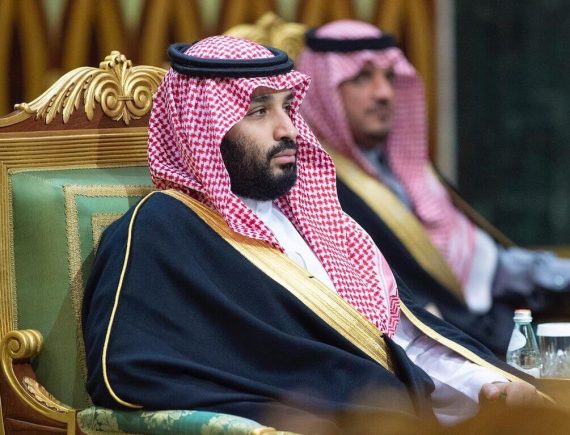The Joe Biden administration just kicked the ball out of bounds. I am obviously referring to the White House’s response to the Director of National Intelligence’s (DNI) declassified assessment of the Jamal Khashoggi murder.
The U.S., which has long claimed to advocate for human rights chose advancing its strategic interests at the expense of people and human rights in the Middle East. The story of Jamal Khashoggi is only an example of how the U.S., both under Republicans and Democrats, is can twist the truth and choose the side of de facto rulers.
Let’s face it: The Democrats are extraordinarily skilled at aestheticizing and facilitating the multidimensional exploitation of any issue. This time around, they invented a new category for people believed to engage in serious activities against opponents outside their country’s borders – and called it the Khashoggi sanction.
Seventy-six Saudi nationals have thus been subjected to a visa ban, as members of Saudi Crown Prince Mohammed bin Salman’s (MBS) security detail, known as the Rapid Intervention Force, were added to the sanctions list.
When it came to the murder itself, however, the Americans even refrained from a symbolic gesture against MBS, whom they apparently hold responsible for Khashoggi’s slaying. The crown prince will now be treated as a minister of defense.

VIDEO: Political Blocks in the Middle East
For the record, hardly anyone was surprised to hear what the U.S. ended up doing. In particular, anyone who said that the Biden administration’s references to democracy and human rights wouldn’t actually hurt American geopolitical interests (in fact, just the opposite), had predicted this outcome.
The recalibration of Washington’s relations with Riyadh was expected to be limited in scope. In the end, the United States addressed the Donald Trump administration’s excesses, as Secretary of State Antony Blinken’s emphasis on American values and call on Saudi Arabia to stop state-sanctioned assassinations merely amounted to a slap on the wrist.
Some pro-Saudi commentators even interpreted the lack of sanctions as an “acquittal.” Indeed, the crown prince had already assumed “symbolic responsibility” as his country’s de facto ruler.
In other words, Biden did not banish MBS as he once promised. He committed to focusing on the future instead.
U.S. rationale in the case
Geopolitical interests trump everything else. Washington opted to preserve its “strategic partnership” with Riyadh that dates back to the end of World War II. The fact that MBS, the de facto ruler, would replace his father, King Salman, and be around for decades persuaded the Biden administration’s decision.
The crown prince had already eliminated his rivals and critics during the Trump presidency when he received preferential treatment. Right now, there is no alternative to MBS.
Any direct action against the Saudi crown prince would have radically changed the balance of power in the Middle East. A new chapter may have begun in relations between the regional powers – Iran, Israel, Turkey and the kingdom.
The Americans need the Saudis to be on their side in Yemen, Iran and Iraq.
At a time when Washington seeks to reinstate the Iran nuclear deal, alienating Riyadh would have also hurt the interests of Israel and the Gulf states.
The Americans need the Saudis to be on their side in Yemen, Iran and even Iraq. Moreover, any attempt to banish MBS may have resulted in his pursuit of closer relations with China and Russia to abandon the kingdom’s traditional alliance with the U.S.
For Republicans and Democrats alike, the superiority of real interests over values is part of the American way of life.
If necessary, the so-called Khashoggi sanctions will be imposed, possibly more harshly, on countries like China and Russia – despite the Saudi crown prince’s exemption – selectively, without risking American interests, and according to double standards.
Recommended
The Saudi affairs
Biden spoke with Saudi King Salman last week, just before the release of the CIA’s declassified report on the murder of Jamal Khashoggi to exchange views on Yemen, Iran and human rights. It remains unclear how the new administration will “overhaul” the U.S. policy on Saudi Arabia.
Saudi Crown Prince Mohammad bin Salman (MBS), whom Biden does not consider his counterpart, has been calling the shots since 2017 due to his father’s advanced age. The suspension of arms sales to Riyadh, Washington’s vocal criticism of Saudi involvement in Yemen, the debate on the potential delisting of the Houthi rebels and MBS being implicated in the Khashoggi report are all precursors to the Biden administration’s review of America’s Saudi policy.
Will the Biden administration, which talks a great deal about human rights, target MBS based on the declassified findings? Any attempt to remove from power or significantly contain MBS would clearly create a new balance of power in the region. It would come as a surprise, however, if Washington were to go beyond a symbolic punishment.
The U.S. and the Middle East
Eventually, I believe the Biden administration will be compelled to deal with Middle Eastern issues, including that of Saudi Arabia, for two reasons. The new administration needs to pay close attention to the U.S. presence in the region, from Afghanistan to Iraq to Syria, as well as the pressing issues on the ground.
The U.S. airstrikes against Iran-backed militias in Syria were an act of retaliation. Washington had now responded to an earlier attack against its military base in Irbil, Iraq. That “proportionate” military response signals America’s preparedness to use force.
Biden’s demand that Tehran stops enriching uranium without lifting his predecessor’s sanctions makes it seem unlikely the parties will meet to negotiate soon. The Iranian leader, Ali Khamanei, turned down Washington’s request and added that “the post-U.S. era has started.”
Iran now prepares for a transition from Trump’s maximum pressure to Biden’s smart pressure. The Americans can create a new balance of power in the Middle East by making small changes, but they won’t be able to wash their hands of the region altogether.
Each fresh equilibrium stands to fuel competition between Russia, China and regional powers.
At the same time, Washington cannot simply avoid the repercussions of containing China (“the strategic threat”) and Russia (“an opponent”) for the Middle East, Africa and Central Asia.
The U.S. can hardly preach other countries about human rights anymore. The fact is that the shadow of Jamal Khashoggi will continue to haunt his murderers and U.S. officials who dare to defend the rights of journalists.





